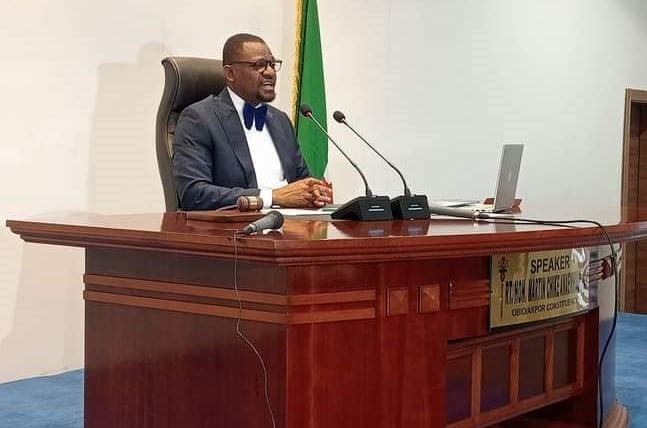On July 29, 2025, the United States Embassy in Nigeria posted a striking message on X (formerly Twitter), drawing global attention to a growing dissonance within the Nigerian political landscape.
Sharing a report by The Africa Report, the Embassy spotlighted what it described as a “lack of fiscal responsibility” among Nigerian governors, many of whom are reportedly spending billions of naira to build or renovate government residences and offices, despite the country’s ongoing economic crisis. The post threw a spotlight on the persistent paradox of elite indulgence amid mass suffering.

The report cited specific examples: Oyo State’s N63.4 billion renovation of its Government House, Gombe’s N14.9 billion for a new ultra-modern governor’s residence, and another N14.23 billion on a new House of Assembly complex. These figures, jaw-dropping in their scale, have reignited national conversations about governance, public trust, and the legitimacy of leadership.
A Fractured Social Contract
In political theory, the legitimacy of any government rests on the strength of its social contract which is the implicit agreement between the governed and their leaders. When President Bola Tinubu urged Nigerians to “tighten their belts” amid the removal of fuel subsidies and floating of the naira, it was expected, at least rhetorically, that the ruling elite would also make symbolic and material sacrifices. Yet, the ongoing revelations expose a governance model that demands austerity from the masses while preserving opulence for the few.
At the heart of the outrage is not simply the spending but also the timing and priorities. Most Nigerians are battling an inflation rate above 30%, food insecurity, worsening unemployment, and a depreciating currency. Under such conditions, the construction of marble-tiled offices and extravagant government lodges amounts to a betrayal. It is a reminder that, for many politicians, leadership is still viewed less as a platform for stewardship and more as an entitlement to privilege.
This widening chasm between citizen and state weakens the fabric of democratic accountability. As trust erodes, so too does civic engagement, belief in institutions, and the willingness to comply with the state, be it in paying taxes or respecting public policy.
Governance as Performance
What makes this trend even more alarming is its recurrence across multiple states, irrespective of region or political party. The ostentatious spending on government infrastructure is often cloaked in the language of modernization or legacy-building. Some governors have argued that such buildings are necessary to “attract investors” or “reflect the dignity of the office.”
But these arguments are, at best, distractions. The truth is that many of these expenditures are performative. They serve to project power and success rather than facilitate good governance. In a country where basic amenities are scarce, where schools operate without roofs and hospitals lack running water, the construction of palatial residences is an aesthetic betrayal of the poor.
Indeed, governance in Nigeria often becomes a theater of prestige, where the size of convoys and magnificence of offices become proxies for performance. In such a culture, fiscal prudence is interpreted not as a virtue but as a weakness. Governors who resist the urge to splurge are often accused of lacking “vision” or “ambition.” This culture must be interrogated.
International Optics: A Reputational Cost
The US Embassy’s decision to share the report is far from trivial. While diplomatic missions often maintain a neutral tone in public commentary, this post was unambiguous in its condemnation. It signals growing concern within the international community about the mismatch between Nigeria’s governance narratives and the lived reality of its citizens.
What does it mean when Nigeria, Africa’s largest economy and most populous nation, becomes a case study in elite impunity? For one, it complicates global partnerships. International financial institutions are more likely to tighten lending conditions, and bilateral donors may recalibrate their aid models, pushing for stricter oversight.
Moreover, it tarnishes Nigeria’s soft power. For young Nigerians attempting to rebrand the country through tech innovation, music, fashion, or diaspora diplomacy, such headlines undermine their efforts. They become reminders that no matter how dynamic the people are, the political class continues to embody the worst clichés of post-colonial statecraft. Greed, excess, and detachment.
The Ramifications for Citizens
Perhaps the most tragic consequence is what this culture of elite consumption does to the morale and expectations of citizens. In a nation with vast youth unemployment and rising emigration, young people are already losing faith in the possibility of reform from within. Extravagant spending amid national hardship only accelerates the “japa” syndrome.
This disillusionment bleeds into political participation. Voter turnout declines, civic apathy rises, and the very mechanisms of democratic renewal weaken. In this environment, politics becomes a game for the wealthy and well-connected, perpetuating a cycle of exclusion and despair.
Toward a Culture of Accountability
The response to this crisis must be both institutional and cultural. Firstly, Nigeria’s fiscal institutions, from the Revenue Mobilization Allocation and Fiscal Commission (RMAFC) to state-level procurement agencies, must be strengthened and made more transparent. Budgets for non-essential infrastructure should be made public, debated, and subjected to citizen scrutiny.
Secondly, civil society and the media must continue to play their watchdog roles. Investigative journalism, digital activism, and community organizing remain some of the few tools available to hold power to account.
Thirdly, reform-minded governors must speak out. Silence from other state executives only reinforces a perception of complicity. It is not enough to “do better” quietly. There must be public repudiation of excess. Leadership, after all, is about setting norms.
Finally, citizens must reimagine their expectations. Politicians are not kings. They are stewards. The myth that “our own must chop” has served only to entrench kleptocracy. Accountability begins with redefining what we celebrate.
Conclusion
The US Embassy’s post reflects not just the irresponsibility of some governors but the deeper malaise in Nigeria’s political culture. A normalization of elite privilege amid public suffering.
As the world watches and Nigerians endure, the path forward demands courage: from leaders willing to govern differently, from citizens prepared to demand better, and from institutions committed to transparency over theatrics. Nigeria’s true greatness will not be built in marble halls but in the choices made every day to honor the people’s trust.












